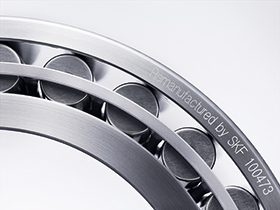

The SKF Circular Economy Centre has secured a new customer on the strength of its capabilities in bringing deliverables that combine optimised operations and cost savings with environmental benefits. Aligning with SKF’s circular economy drive, the organisation continues to innovate its products, systems and services. One of SKF’s greatest strengths is the development of new technologies and value -dding solutions to assist customers in achieving their economic and environmental sustainability goals.
“This proud reputation prompted the customer, who is a leading operator in the mining sector based in Gauteng, to approach us in August 2022 for a bearing remanufacturing solution,” says Lourens Pretorius, manager of the SKF Circular Economy Centre. “The customer later called for a further 18 gearbox bearings to be sent in to SKF’s Reman Centre for assessment.”
What initially started with a request for a site inspection of spherical roller bearings (SRBs), while still on their respective shafts, to determine if they were suitable for remanufacturing, was followed by a fully integrated solution from the SKF Circular Economy Centre. This included the supply of new and refurbished bearings, mounting tools and local engineering components, and additional support services such as professional bearing fitment and a condition monitoring solution that called in the expertise of SKF’s Mechanical Field Service and Connected Technologies.
“We remanufactured a total of 25 bearings and replaced three bearings that did not pass our remanufacture assessment requirements,” explains Pretorius. “We also supplied 11 new units, and local engineering components comprising new bearing sleeves and lock nuts.”
Pretorius weighs in on the value of SKF’s specialist Remanufacturing Centre. “In the true sense of what makes up a circular economy, our remanufacturing capabilities enable us to reduce, reuse and recycle. Instead of being replaced, remanufactured bearings are given a new lease on life and are reused. As remanufactured bearings are much more cost-effective than new bearings, we have kept costs down significantly for our customer,” he explains. “Moreover, the waiting period for certain large size bearings can be up to several months, but as we are able to remanufacture bearings within three to five working days we have substantially reduced the lead times, getting our customer fully operational within only a few days.”
He adds that SKF’s remanufactured bearings and units conform to the same geometric form and quality specifications as new SKF products. The remanufactured components carry a one year conformance warranty, which is a testament to the high quality and reliability of these products. Finally, Pretorius points to the fact that bearing remanufacture reduces material consumption; bearings not eligible for remanufacture can be recycled to produce new bearings, effectively closing the loop.
SKF’s Mechanical Field Service team stepped in to ensure that the bearings are correctly fitted by using a selection of Mapro mounting tools, including a bearing heater, hydraulic nuts and spanners; a C-Spanner was purchased by the customer. In addition to providing a baseline vibration monitoring required by the customer to ensure that the equipment passes all the necessary requirements before commissioning, SKF’s Connected Technologies team was also able to provide baseline readings on other critical equipment.
The complete SKF solution includes condition monitoring; vibration and temperature data is collected in real-time and analysed to identify potential issues on the bearings. Alongside extending bearing life and increasing mean time between failures (MTBF), condition monitoring and data analytics also identify potential bearing failure, enabling the unit to be removed timeously for repairs or replacement, reducing the risk of costly production stoppages.
Pretorius sums up the sustainability benefits of SKF’s turnkey solutions: “Benefits for our customer include increased service life, machine and equipment reliability and lifecycle, and operator safety, with all the related cost savings. These factors are fundamental to ensuring sustainable operations. Furthermore, reduced material consumption, direct energy consumption and emissions as a result of our reman process reduce the impact on the environment.”
He confirms that the work for the customer is ongoing. “We have identified more areas where we can add further value for our customer and are bringing our other departments on board to lend their professional expertise,” he concludes.

© Technews Publishing (Pty) Ltd | All Rights Reserved